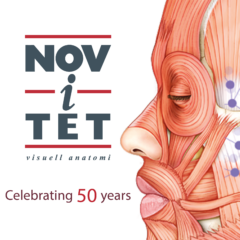Abbotts FreeStyle Libre-teknik visar positiva effekter för typ 2-diabetes, minskar risk för hjärtsjukdomar
Nya resultat visar att Abbotts FreeStyle Libre-teknik (kontinuerlig glukosmätning) har en rad positiva effekter för personer med typ 2-diabetes. CGM minskar bland annat risken för hjärt- och kärlsjukdomar och förbättrar den glykemiska kontrollen, vilket gör det lättare att upprätthålla hälsosamma och stabila blodsockernivåer.
De viktigaste resultaten som presenterades vid konferensen:
1. I en stor studie med 12 480 patienter fann man att personer över 66 år med typ 2-diabetes på basinsulinbehandling upplevde en signifikant minskning av långsiktiga blodsockernivåer, samt färre besök på akutmottagningen och sjukhusvistelser efter att de började använda FreeStyle Libre för att hantera sin diabetes.
2. En ny studie visar att långtidsblodsockervärdena (HbA1c) hos personer som använder CGM för att hantera sin typ 2-diabetes sjönk med 1,0 procent från 12 månader före (8,8 procent) till 12 månader efter att de börjat med CGM (7,8 procent). Baserat på den banbrytande UKPDS-studien är varje 1-procentig minskning av HbA1c förknippad med en 16-procentig minskning av risken för hjärtsvikt, en 14-procentig minskning av hjärtinfarkter och en 12-procentig minskning av stroke.
Vad är EASD: EASD är en internationell organisation som arbetar för att främja forskning, utbildning och behandling inom diabetes. Varje år är EASD värd för en stor konferens där forskare, läkare, vårdpersonal och läkemedelsföretag samlas för att dela med sig av de senaste resultaten och framstegen inom diabetesforskning och behandling.
Läs det officiella pressmeddelandet här:
Abbott at EASD 2024: Exploring the expanded benefits of continuous glucose monitoring
During the 60th European Association for the Study of Diabetes (EASD 2024) in Madrid, Abbott will share new insights and outcomes that highlight the expanded benefits of FreeStyle Libre technology for people living with diabetes across a spectrum of diabetes management therapies, including improved glycemic control and reduction in the risk of cardiovascular diseases (CVDs).
These topics will be covered during Abbott’s industry presentations featuring notable key opinion leaders (KOLs) from Italy, Spain and the United Kingdom.
*Media are invited to attend in person or online. Please contact Anita de Groot to receive a link to Abbott’s presentations.
• Abbott’s Hot Topic Session: Partner Together to Turn Small Steps into Big Wins
September 10, 14:45 – 15:15
Location: Spotlight Stage, Hall 10
Description: Dr. Emma Wilmot and Prof. Sufyan Hussain, two KOLs from the UK will discuss their first experiences with automated insulin delivery systems (AIDs) powered by the FreeStyle Libre 2 Plus and FreeStyle Libre 3 sensors.
• Abbott-hosted Symposium: Powering up Progress: How CGM Insights are revolutionizing Type 2 diabetes care
September 11, 7:45 – 8:45am
Location: Warsaw Hall, North Convention Center
Description: Prof. Stefano Del Prato, Dr. Virginia Bellido, Prof. Ramzi Ajjan and Prof. Robert Storey share their insights on how continuous glucose monitoring (CGM) data can help with improved Type 2 diabetes management and cardiovascular care.
Abbott Clinical Presentations at EASD 2024
Abbott will also be featured in the Short Oral Discussion Area, Hall 10 covering a range of topics, from real-world evidence studies and observational studies that show the positive impact of CGM for people with Type 2 diabetes across different therapies to a systemic review on the burden of diabetic ketoacidosis among people living with Type 2 diabetes.
*Abbott clinical presentations are under media embargo until Tuesday, September 10 at 12:30 CEST
• Short Oral Event D – Wednesday, September 11 at 14:00 – 15:00. Station 12
Abstract #811: Frontier – FreeStyle Libre use in Ontario among patients with type 2 diabetes in the IC/ES database – evidence from real-world practice: patients aged ≥66 years on basal insulin ± GLP-1 RA
Page 2 of 3
This large real-world retrospective cohort study of 12,480 patients shows that people 66 years and older with Type 2 diabetes on basal insulin therapy had a significant reduction in HbA1c levels, as well as fewer emergency department visits and hospitalizations once they started using FreeStyle Libre to manage their diabetes. Those who were using GLP-1 RA therapy along with basal insulin therapy saw larger reductions in HbA1c than those not using GLP-1 RA therapy when they started using FreeStyle Libre.1
• Short Oral Event D – Wednesday, September 11 at 14:00 – 15:00. Station 12
Abstract # 813: Association of CGM use with glycaemic outcomes for people with type 2 diabetes: a multi-centre observational longitudinal study
This multi-center observational study examines the association of CGM use with HbA1c for people living with Type 2 diabetes irrespective of insulin therapy. Analysis of HbA1c values from people using CGM to manage their Type 2 diabetes across five study periods shows that average HbA1c decreased by 1.0% from 12 months prior (8.8%) to 12 months after starting CGM (7.8%).2 Based on the landmark UKPDS study, each 1% decrease in HbA1c level is associated with risk reductions in heart failure by 16%, heart attack by 14%, and stroke by 12%.3
• Short Oral Event E – Thursday, September 12 at 12:45 – 13:45. Station 16
Abstract #1002: Burden of diabetic ketoacidosis among people living with type 2 diabetes: a systematic review
This systematic review of peer-reviewed studies published between January 1, 2014 and December 14, 2023 aimed to quantify the burden of diabetic ketoacidosis (DKA) among people living with Type 2 diabetes. While it is known that people with T1DM are susceptible to DKA, the burden of DKA in Type 2 diabetes is not well understood.
By analyzing data that looked at the epidemiological, clinical, economic, and humanistic impact of DKA in people with Type 2 diabetes, this study concluded that DKA in Type 2 diabetes is associated with significant clinical and economic burden. Additionally, the study identified two groups at higher risk: those taking SGLT2 inhibitors and those on insulin.4
FreeStyle Libre Innovations at the Abbott Booth #B.01
Abbott will showcase its latest technology innovations, including the FreeStyle Libre 2 Plus and Libre 3 Plus sensors that provide accurate glucose readings every minute for up to 15 days and are cleared for use by children aged 2 and up.
Abbott will also highlight its growing list of partnerships between FreeStyle Libre technology and the industry’s leading automated insulin delivery systems and insulin pens. Abbott’s Libre CGM technology is able to integrate with CamDiab’s CamAPS FX mobile app and Ypsomed’s mylife YpsoPump, Insulet’s Omnipod 5 and Tandem’s t:slim X2 insulin pump.5 It recently announced a new partnership with Medtronic to connect Abbott’s most advanced, world-leading Libre technology with Medtronic’s insulin delivery systems.
For more information about Abbott’s diabetes management solutions, please visit Abbott at EASD 2024 (Booth#B.01) from September 10-12, 2024.
Page 3 of 3
About Abbott’s Libre Systems
Abbott’s Libre portfolio is the world’s leading continuous glucose monitoring technology6, now used by more than 6 million people in more than 60 countries7. Clinical and real-world data from the millions of people that use Libre systems show that the technology helps people improve their glucose control, lower their HbA1c, decrease diabetes-related hospital admissions, and improve their quality of life8,9. The systems have partial or full reimbursement in more than 40 countries.
References
1. R. Rabasa-Lhoret, S. Harris, Y. Poon, A. Ratzki-Leewing. FRONTIER – FReeStyle Libre use in ONtario among patients with Type 2 diabetes in the IC/ES database – Evidence from Real-world Practice: patients aged ≥ 66 years on basal insulin ± GLP-1 RA. Presented at EASD 2024.
2. O. Ebekozien, A. Mungmode, O. Odugbesan, M. Basina, S. Tsai, R. Weinstock. Association of CGM use with glycaemic outcomes for people with type 2 diabetes: a multi-centre observational longitudinal study. Presented at EASD 2024.
3. Stratton IM, Adler AI, Neil HA, Matthews DR, Manley SE, Cull CA, Hadden D, Turner RC, Holman RR. Association of glycaemia with macrovascular and microvascular complications of type 2 diabetes (UKPDS 35): prospective observational study. BMJ. 2000 Aug 12;321(7258):405-12. doi: 10.1136/bmj.321.7258.405. PMID: 10938048; PMCID: PMC27454.
4. C. Wysham, Y. Poon, A. Bindal. Burden of diabetic ketoacidosis among people living with type 2 diabetes: a systematic review. Presented at EASD 2024.
5. Not all partnerships are available in all countries.
6. Data on file, Abbott Diabetes Care. Based on the number of patients assigned to each manufacturer.
7. Data on file, Abbott Diabetes Care.
8. The American Journal of Managed Care, Flash CGM Associated With Event Reduction in Nonintensive Diabetes Therapy, 2021.
9. American Diabetes Association, Continuous Glucose Monitors, accessed March 20, 2024.
© 2024 Abbott. The sensor housing, FreeStyle, Libre, and related brand marks are marks of Abbott. Product availability varies per individual country. ADC-98677 v1.0 9/24





